What’s up with this letter? For years it’s been lying around in a drawer flaunting its sketches in a come-hither way sure to grab my attention.
Despite my tendency to swoon at the sight of old paper with writing on it, it was always immediately obvious that it would take some effort to figure out what was going on in this one. Passing glances at the text didn’t illuminate the subject matter in a way that attracted a longer gaze, and fact that the writing laces around and through and between the sketches (kind of like this post) added to the effort required to read it. It was also clear that the writer meant to be entertaining, so a reader would have to catch up with a sense of humor that might belong to another age.
No one has ever asked to see the letter. It was probably “hidden” in the sense that it doesn’t seem to be attached to a collection and it isn’t catalogued. I have no idea how the letter got here and until recently (until my turn at the blog rolled around) I never had occasion to take it out and really examine it just to satisfy my own curiosity.
Last week I finally took the letter to my desk to transcribe it, but before I completed that task I did a little research to learn about the writer, Henry Chester Kellogg (1819-1896). Understanding Henry’s background – knowing who comprised his world — provides some context for his letter. Somewhere along the way it dawned on me that the 27-year-old correspondent was Emily Dickinson’s neighbor when the Dickinson family lived on West Street, with Kellogg families to their south.



The young Kelloggs – Henry’s brothers, sister, and cousins — attended Amherst Academy both before and during Dickinson’s attendance. Henry’s sister Eliza Mary Kellogg, later Mrs. Hanson L. Read, figures in Dickinson’s letters, as do his cousins Emeline and William Kellogg. Other records show that Henry and his brother Dwight stayed in town and worked as shoe makers, while brother William Wallace Kellogg worked as a printer in Eastern Massachusetts and was a state senator.
In our letter, Henry writes to brother William about nothing, or to be more specific about what constitutes “nothing,” about the practice of letter writing when one has nothing to say. He touches on the love life of the recipient (mostly wondering whether there is one). There are some slightly more straightforward (and cheeky) updates about the people they know. It’s reminiscent of some of Emily Dickinson’s letters to her brother in which she strings him along just to exercise her pen, to give Austin something to read while he’s away from home.
The transcription below is cleaned up a bit to make it easier to read, with punctuation added here and there, a few spellings corrected, and with “clarified” sketches as accompaniment.
Amherst Aug. XXIII, 1846
“How are you Bill, what’s the NEWS?
“I’m well enough. How be you old cove? I didn’t know as you was alive. How did you expect to hear news from me a professional character unless you correspond oftener. Hey?”
Perhaps you may say Mr. Editor that a poor excuse is better than none but you must know in your peculiar capacity that it’s rather of a hard case to get up an article without “matter,” or (to deviate from the term used by your fraternity), a difficult “matter” to write when there’s nothing to write. For all that, you may say that I may make the attempt. I will, and [if?] you will probably be obliged to spare but a few of your valuable moments to run it over, it may, I hope, command a little attention, for I suppose that it is with you as with us a letter from either is acceptable. Father’s health is a great deal better than it has been. His deafness is almost over with, he is about every day, though he has not worked in the shop for two months. Mother, Eliza, and Dwight’s folks are well, but Mary Taylor is quite sick with the typhus fever. I heard today that she was a little better. Minerva & Phila were up there one day this week. Phila has been with us a few days, she is sick now and has had a physician. Her health for a month or two past has been improving, she has been staying in Ashfield at her sister’s. Laurette is in visiting at Cambridge I believe. Mary Stacy is in town, she was down to our house last week with Stephen Hubbard. Hiram Fox has sold out to Merrick Marsh and is going to Baltimore. Needham has gone home to stay a spell. [Very] dull times since commencement. I understand Hon. Dickinson [Judge John Dickinson?] is going to live with Martha Kellogg soon, and yet another Dr. Fish* is a going to marry that dried up and wrinkled specimen of a maid (Old [Pickle?]alias) Old Priest Nelson’s Daughter. What a number of
she will break.
Speaking of courtship, love, and marriage, the Junior editor of the W. Tower has probably learned by “sad experience long ere this that “the course of true love never did RUN smooth” or that “come weal come woe” go where you will the object of our attachment will surely follow even though we plunge into the foaming billows she “our” adored is near us, close to our HEELS.
You probably have seen the proceedings here on commencement they were about as usual not over nor above interesting. I think myself that the Circus which was in East Street drew quite as large a congregation of the people as they had two exercises, crowded, and very good. I understand they made a fine appearance as they came in from N. Hampton about ½ past 8 in the morning just as the church open[ed] to ladies. The band looked & played finely, in uniform and “drawn by a splendid omnibus drawn by 12 beautiful cream colored horses.” Who should I see but Severus Brisbee that morning. You know he has been gone a good while to sea, he has been in town I understand several weeks. We did not have much company, Dwight’s folks had the most. Calvin his wife, Hannah, and her son, aunt [Kilton?] went home with them. Horace and his wife were down to Dicks. I did not see them, they are a going out to Mt. Morris, N. York soon I believe. Charles was down. Speaking of Music I did not think the N. York Cornet band 5 of them played near well as the Boston Brass last year, it was the general opinion. They paid them $150.00-. Dewey spent a couple of days with me, the day after we went on to Mt. Norwottuck with half a dozen others, a fine place I assure [you], and a fine view in a clear day. Dewy thinks of going down east on a singing tour again I believe.
You don’t inform us what progress you make with the fair sex. I trust in your responsible station your [ideas] of proper respect, & sincere protestations will be strictly adhered to. You have some idea of the pangs of “ill requited hafection” and know that when she loves the lord of her
she loves him over all others, and when in your noonday walks she invokes you to admire “the brilliant orb of day,” while you think it round as a cheese and bright as a lanthorn, she thinks and how otherwise that you are the man she took you to be. Then it becomes you a professional character, as a man of character, to put on a bold and confiding face and speak of the ardour of your affections, and the sincerity of your intentions.
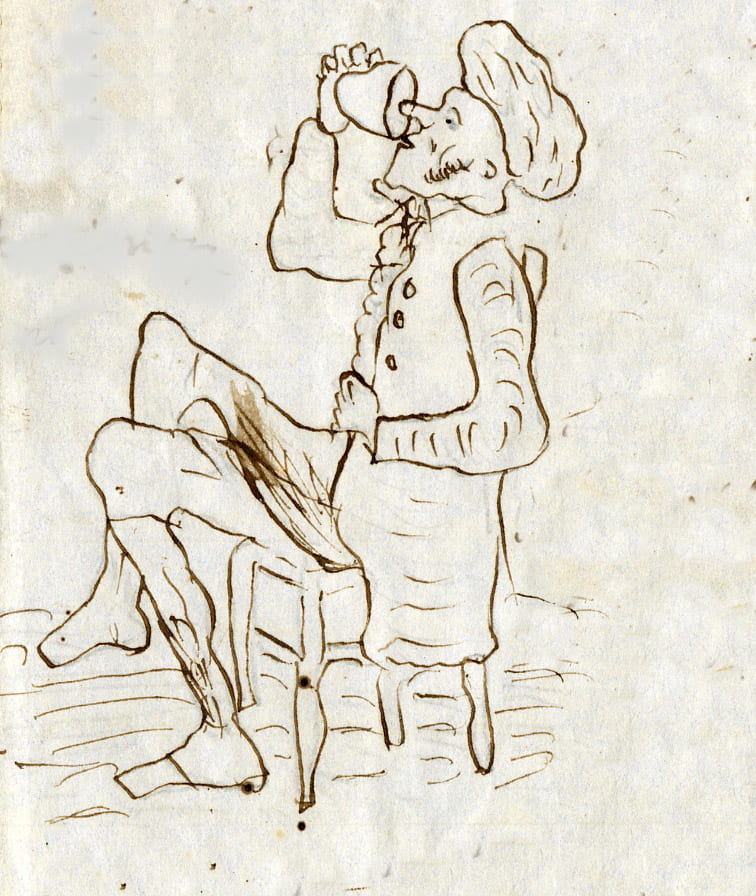
Perhaps your mind may wander back to the time when you sipt the delicious current nectar wine without ceremony in her parlour as none but a “lover “ ever enjoyed that privilege, and anticipate the time, when the silken tie that binds 2 willing
is consummated, you can sing in character “My wife shall dance and I will sing so merrily & pass the day for I hold it one of the wisest things to drive dull care away” or, if my lord prefers, the WOODEN SHOE DANCE.
If you are disappointed in this silly article I refer you to my apology and to an oldage [sic] “a little nonsense now and then is relished by the wisest men” hem hem. Now William I will thank you to write soon, just insert an occasional adventure anything to fill up (as above). “Mother says tell William to be sure and come home Thanksgiving, and not work so hard as to get sick.” You have it word for word. If there’s anythink [sic] that you care about that I have not mentioned, name it and you shall have it if it is in my power to picture it out or communicate in any way. This is without doubt from your absent brother H.C. Kellogg.
Addressed to Wm. W. Kellogg Esq, Georgetown, Ma. With a postmark “Amherst Aug [21?]. Along the edge, “H. C. Kellogg, Recv’d Aug 23, 1845,” presumably in William’s hand. Did William note the date later? He’s off by a year: the New York Cornet Band was at the 1846 commencement, and Henry’s “6” is easily taken for a “5.”
* “Another Dr. Fish” is Dr. Seth Fish. In September 1846 Dr. Seth Fish married Emily D. Nelson, daughter of “Old Priest Nelson,” Stephen S. Nelson, a founder of the “Amherst Branch of the First Baptist Church in New Salem” (History of Amherst, Carpenter & Morehouse, p. 234). Amherst College has administrative offices in the building now. Dr. Fish’s son was Dr. D.B.N. (Dyer Ball Nelson) Fish (AC 1862 but non-grad), the “strange physician” who attended Dickinson when she fainted in August 1884 (see Johnson’s Letters, no. 907).
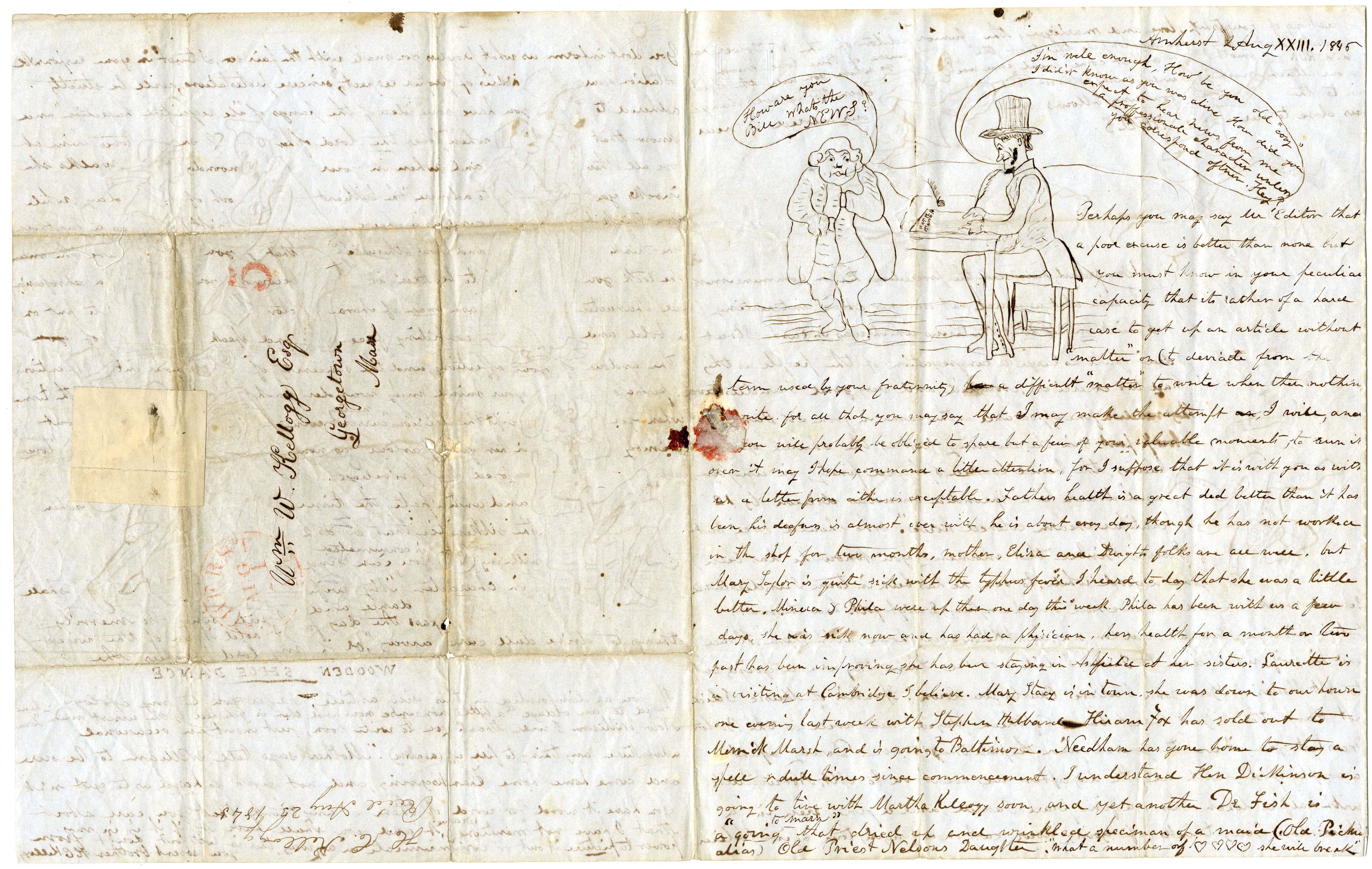
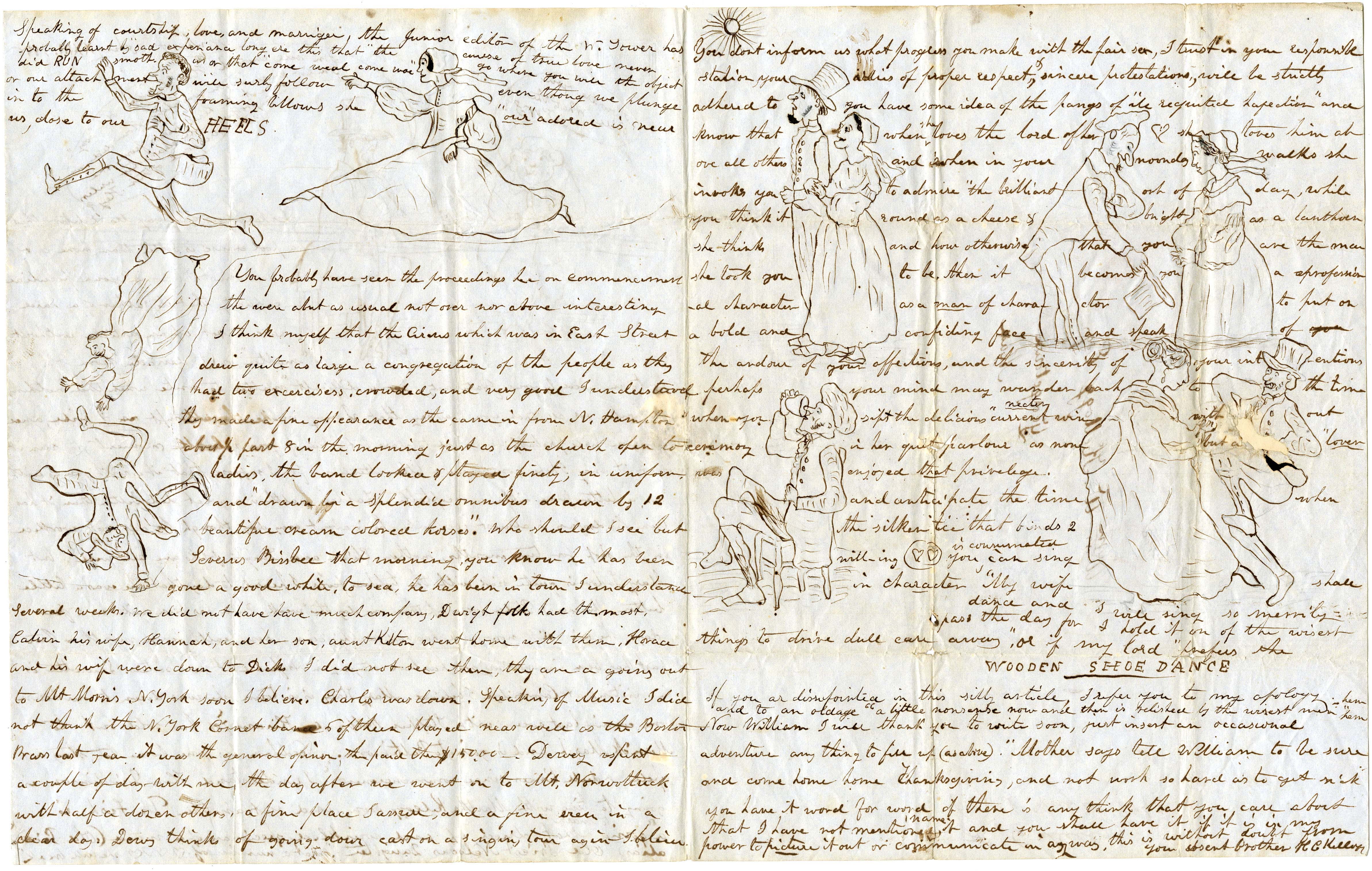
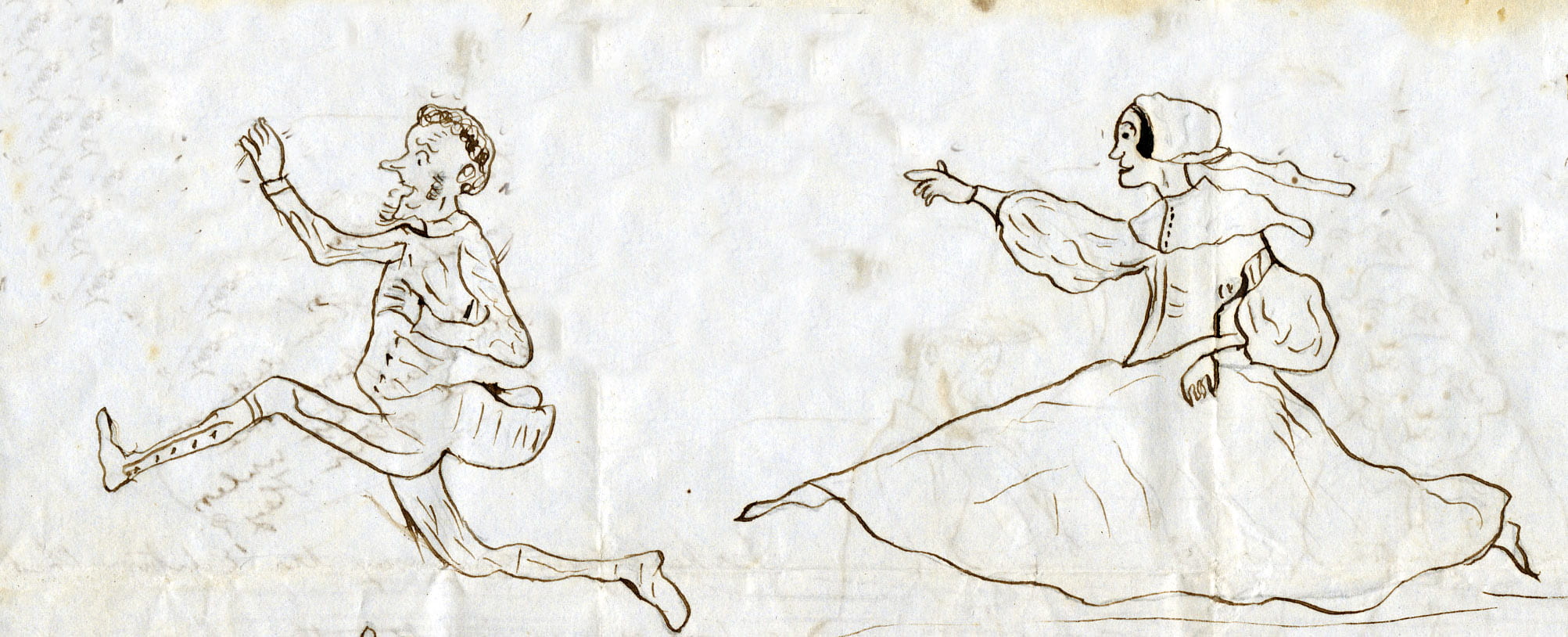
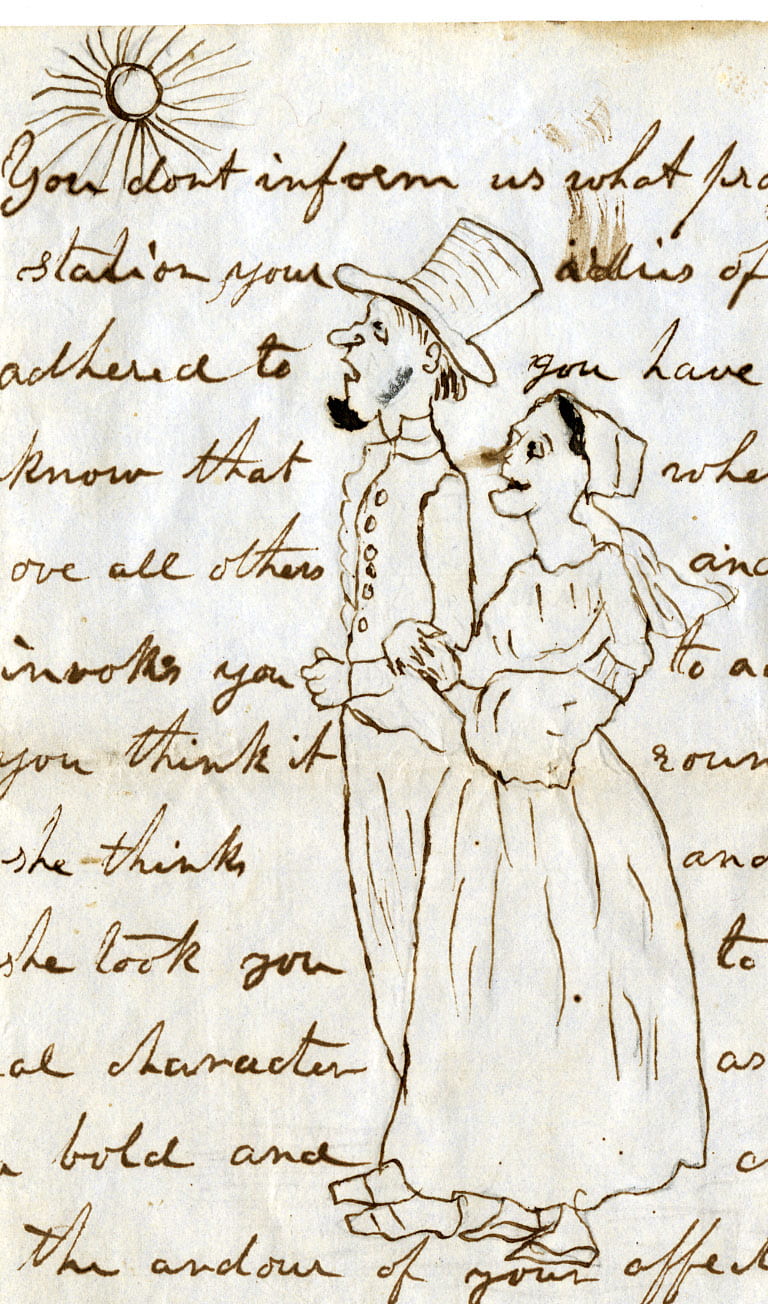
These pictures in the letter are mimiced from the second earliest comic book printed in U.S.A, THE VERITABLE HISTORY OF MR. BACHELOR BUTTERFLY, 1845, (Originally this Rodolphe Töpffer’s comic story was published in french magazine l’Illustration (1845) with the name Mr. Cryptogame). So Kellogg wes familiar with this comic.
Spot on, and well caught! Thanks for bringing this to our attention. I see the comic is nicely digitized at archive.org:
https://archive.org/details/McGillLibrary-122951-2115 .